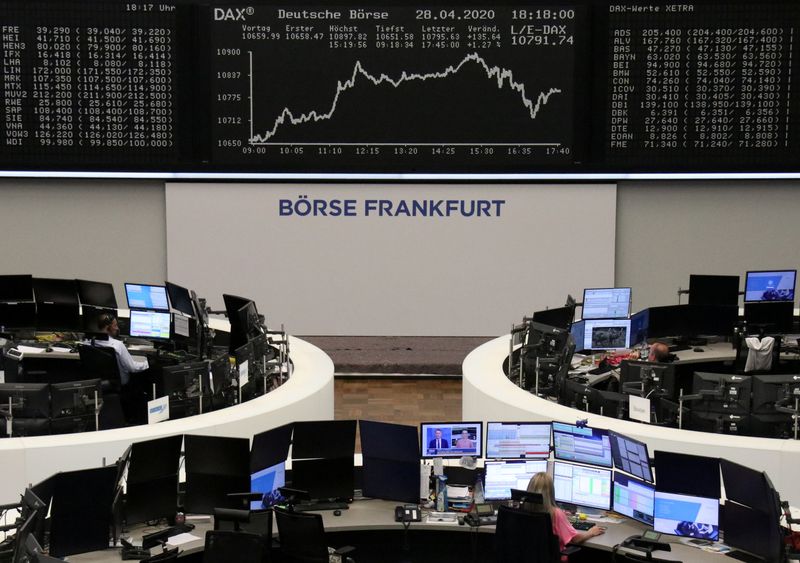By Dhara Ranasinghe and Tommy Wilkes
LONDON (Reuters) - Funding costs in a vital corner of euro zone money markets remain at worryingly high levels even after unprecedented ECB action, indicating the central bank may need to do more to ensure a smooth supply of short-dated credit to the economy.
Despite a month of bumper corporate bond sales and a 25% equity bounce, in short-term lending markets where European banks and companies turn for their immediate outgoings, a key rate, the three-month Euribor, remains at double the levels of early March.
For a graphic on euro rates, click https://fingfx.thomsonreuters.com/gfx/mkt/rlgvdwkampo/euro%20rates.JPG
This rate, the average at which European banks borrow from one another, is the basis for pricing products such as interest rate futures as well as savings and mortgages. A high Euribor rate implies a tightening in financial conditions, in turn diluting the impact of the ECB's aggressive monetary easing.
A variety of reasons could be driving this, including concerns over fragile southern European states and banking sectors.
Many also blame the huge quantities of short-dated debt governments are raising for pandemic-fighting efforts - Germany alone will issue 72 billion euros in the second quarter.
This supply may be dampening demand for commercial paper, securities which banks and companies sell to raise cash from money market funds.
Whatever the reason, money market rates in Europe are not falling like they have in the United States, and many are worried.
Mauro Vittorangeli, CIO for conviction fixed income at Allianz (DE:ALVG) Global Investors, saw the Euribor stress as "linked to a rise in pressure on the system as a whole."
"Stabilising the money markets is important because this is a first stop for corporates for finances," Vittorangeli said.
Three-month Euribor last week hit its highest level since 2016 at -0.16% and is not far off those levels now at -0.23%
The Libor equivalent in U.S. dollars has fallen 70 bps from last month's highs
Not everyone is concerned that high Euribor rates reflect funding stresses, noting that the fixing can be influenced by other short-term rates and factors such as the supply of commercial paper.
For a graphic, click on https://fingfx.thomsonreuters.com/gfx/mkt/jbyvrjlxgve/SnipImage.JPG
WHAT CAN ECB DO?
But the longer interbank rates remain high, the greater the pressure on the central bank to act.
The European Central Bank will likely expand its 750 billion euro emergency bond-buying scheme, perhaps even this week.
But calls are mounting for it to more effectively backstop money markets, possibly along the lines of the U.S. Federal Reserve whose Commercial Paper Funding Facility allows it to lend to firms unable to borrow in short-term markets.
That move sharply lowered dollar money market rates.
The ECB has so far eased the requirements for collateral and widened the pool of commercial paper it would buy, moves investors say are helpful but inadequate.
"Accepting commercial paper from corporates as collateral has improved short-term liquidity risks. But the ECB doesn't take commercial paper from the most distressed names," said David Arnaud, senior fund manager, fixed income at Canada Life Investments.
"So the ECB policy response only focuses on a certain part of the market and ignores the most distressed sectors and names."
The International Capital Market Association, a trade group, last week wrote to the ECB, asking it to include asset-backed commercial paper in a list of assets eligible to be posted as collateral.
"A vital source of funding is at risk of being disrupted", it said.
An ECB survey published this week shows euro zone banks recorded a surge in emergency credit demand from corporates in the first quarter.
Given the opacity of European commercial paper, it's hard to pin down rates, but sources familiar with the market say it has not normalised to the same extent as in the United States.
Spreads on U.S. three-month commercial paper rates
Also JPMorgan (NYSE:JPM) analysts noted last week that European commercial paper issuance continues to shrink: Issuance by financial institutions was 49 billion euros lower than in early March, suggesting "some funding pressures remain."
In contrast, the stock of outstanding U.S. commercial paper rose last week for the first time since mid-March and assets managed by prime money market funds - natural buyers of commercial paper - also rose, JPMorgan told clients.
A treasurer at a large multinational said the European commercial paper market had reopened only slowly since early April, with liquidity in longer tenors still insufficient.
That's forcing some borrowers into bond markets for financing, Reuters has reported.
For some, the spike in Euribor does not reflect heightened funding pressures. It can be attributed to borrowers issuing commercial paper in euros, then swapping into dollars, a trade which made sense after the Fed flooded the market with dollars in March.
A declining yield pick-up on swapping euros into dollars will eventually push Euribor lower, they argue.
